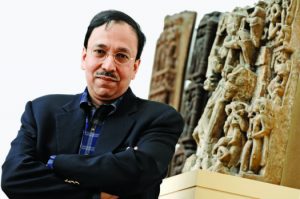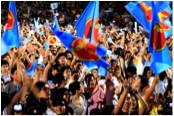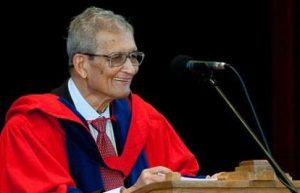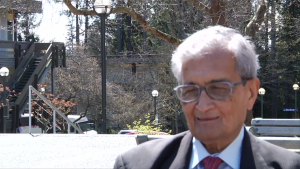Livelihood Clashes in Inner Mongolia and Mongolia
Memo #87 – The Southern Mongolia Human Rights Information Center, a U.S.-based group, has been reporting on protests in cities along the central-northeastern border between the Inner Mongolia Autonomous Region (IMAR) in China and Mongolia. These reports raise the spectre of ethnic conflict between Han Chinese and Mongolians. In fact, the origins of conflict are less ethnic in nature and more of a clash between traditional pastoral livelihoods and mining operations.
The Indonesian Model: Learning from a Muslim Majority Democracy
Memo #86 – With the old autocracies of the Middle East falling and new regimes yet to emerge, policy makers are grasping for models that can inform analysis. U.S. President Obama has proposed the ‘Indonesian model.’ The logic is straightforward: Indonesia is a majority Muslim country that has transitioned from a military dominated autocracy to a democracy.
The Significance of Tagore – Harvard Professor Sugata Bose (Video Interview Part II)
Memo #85 – In April 2011, The University of British Columbia (UBC) celebrated the 150th birthday of Rabindranath Tagore. As part of this celebration, Dr. Sugata Bose, Gardiner Professor of Oceanic History and Affairs at Harvard University spoke at the Institute of Asian Research on “The Oceanic Voyages of Rabindranath Tagore.” The following week, UBC presented Nobel laureate Dr. Amartya Sen with an honorary degree. On April 19, Asia Pacific Memo published Part I of Dr. Sugata Bose’s interview, “Tagore in Today’s World.” We also interviewed Dr. Amartya Sen who spoke about Tagore’s significance and distributed the full video recording of Dr. Sen’s honorary degree ceremony and speech.
The Shifting Role of Law in Myanmar
Memo #84 – A Myanmar court on March 29, 2011 granted bail to Australian businessman Ross Dunkley accused of assaulting and unlawfully confining a sex worker. Dunkley said he would fight the charges. “I just can’t believe there is a case,” Agence France Press quoted him as saying. “There is no witness, there is no evidence. “
Ten Years after Indonesia’s ‘Big Bang’
Memo #83 – 2011 marks a decade since the implementation of Indonesia’s democratic decentralization project (the ‘Big Bang’), the largest of its kind in the world. With the exception of Jakarta and three other provinces with special autonomy arrangements, most state powers and responsibilities were devolved to sub-provincial governments. Ten years ago, there was a nationwide reordering of the structures and processes of government and we can now evaluate the success of these policies.
Turn of Tide: Singapore’s Watershed Election 2011
Memo #82 – On May 7, 2011, 2.06 million Singaporeans cast their votes and returned the People’s Action Party (PAP) to power. Most parties would be happy with the PAP’s 60.1 per cent vote and 81 out of 87 seats. But the result was the party’s worst performance since 1963, a far cry from its 75 per cent vote share during its heydays in the 2001 general election (see Figure 1). Singaporeans were disaffected and voted two cabinet ministers and a candidate slated to be speaker of the House out of office. In an election post-mortem, both minister mentor Lee Kuan Yew and senior minister Goh Chok Tong resigned from the cabinet.
Nobel Laureate Amartya Sen Receiving UBC Honorary Degree (Video Recording)
Memo #81 – Nobel laureate economist Amartya Sen was awarded an honorary degree by The University of British Columbia at a special ceremony on April 21, 2011. In his address, Dr. Sen argues for an interdisciplinary approach to the pursuit of knowledge, citing the economist Adam Smith as an exemplar of integrating disciplines and thereby enriching the very nature of reasoning itself. He further draws upon the pragmatic social strategy of the Indian Nobel laureate poet Rabindranath Tagore, whose ideal of inclusivity in both education and life would, says Dr. Sen, resonate profoundly with UBC’s own efforts at productive dialogue between disciplines.
Thai-Cambodian Border Clashes – What is Fuelling them?
Memo #80 – Since the end of April 2011, fighting between the Thai and Cambodian armies along their disputed border killed 18 people, injured over 120, and displaced nearly 100,000 villagers. Since hostilities began in July 2008, border clashes have now left at least 28 dead and some 150 injured. The conflict is centred around three ancient temples built by Khmer kings nearly a thousand years ago. But most analysts contend that territory is not the driving concern, rather it is fuelled by domestic politics in both countries.
Dr. Amartya Sen on Tagore’s Significance (Video Interview)
Memo #79 – On April 21, 2011, Amartya Sen, recipient of the 1998 Nobel Prize in Economic Sciences, was awarded an honorary degree by the University of British Columbia.
Understanding Indonesian Migration via Labour Brokers
Memo #78 – Are brokers crucial to international migration in Asia? Yes, based on the results of a recent workshop at the National University of Singapore. Brokers’ importance is increasing due to new bilateral agreements and market deregulation. But a full analysis of Asian migration also depends on understanding the social relationship between brokers and migrants, and the way migrants come to trust an emerging class of informal brokers.




